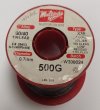Dave Merrill
Axe-Master
Interesting, thanks for the info, but you're right, too late, already bought the Weller.It has been a while since this post started so this may not be useful information for this situation now. However, I went down the soldering station road earlier this year. I started building some pedals and needed a better iron. I ended up with this one below. I was also looking at the Weller and found better reviews on this one and it isn't much more money. I can tell you this thing is a legit monster. I have soldered everything from components on PCBs to the backs of pots as well as to the trem claw in a guitar and it did all of these things very well. I can't give this thing high enough praises. It just works all the time. I would recommend this over the Weller. Weller has had some quality issues as of late.
Amazon product ASIN B00ANZRT4M
I've deferred the baseplate install for now, got involved in the Vigier I bought here; there's a thread about it. It's a good guitar.
Haven't figured out if I'm going to keep my EJ too or not. Probably won't do the baseplate mod if I'm going to let it go, just leave it stock for the comfort of potential buyers.

